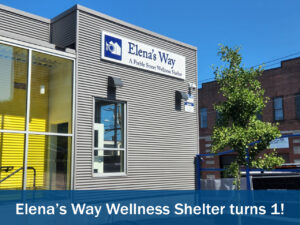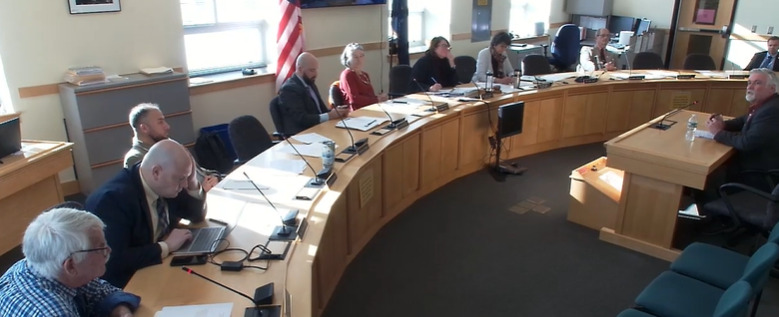Delivered December 5, 2023
Good morning, Senator Pierce, Representative Gere, and members of the Joint Committee on Housing, thank you so much for inviting me to speak to you today. My name is Mark Swann, and I am the Executive Director at Preble Street, a nonprofit human service agency with over fifteen programs serving the most vulnerable people across the state of Maine. The mission of Preble Street is to provide accessible barrier-free services to empower people experiencing problems with homelessness, housing, hunger, and poverty and to advocate for solutions to these problems. This past February, I joined this committee to talk about the two most important solutions for addressing homelessness in Maine.
One of the things we discussed was Site-based Housing First and I want to thank you all again for your tireless efforts to move that legislation forward; it’s because of this Committee and the Mills administration that we have a tremendous opportunity to expand Site-based Housing First throughout Maine and end chronic homelessness. Thank you so much for that.
You may recall that the other topic we talked about was the importance of the homeless shelter network in Maine and the need for significant and ongoing support for emergency shelters. This committee played a key role in the one-time $5 million emergency shelter funding that was included in the Governor’s budget. Thank you for that too.
That funding was critically important, but it was one-time funding. And it was spread among 39 shelters around the state.
And so, we are still in crisis. At a time when homelessness is exploding across Maine and when tragic encampments have popped up throughout the state, Maine’s critically important low-barrier shelters are in danger of closing due to lack of funds.
In fact, the second largest shelter in Maine, in the third largest city in Maine, will close next fall due to an almost one-million-dollar budget shortfall. Bangor’s Hope House, run by Penobscot Community Health Center, announced last month that they will close their doors next fall because of the lack of funding. And while it’s true that they’re hoping to find another nonprofit to step up and keep it running, what organization can do that, facing such a huge funding gap?
Preble Street is one of the nonprofits they’ve talked to, and of course, we want to help. That’s our mission, after all. But we already are dealing with even bigger deficits with our two low-barrier shelters – Elena’s Way and Florence House. Our two shelters have a shortfall of over two million dollars. My Board of Directors would have my head if I took on yet another unfunded shelter. How many cake sales, bake sales, and car washes can we do?
The six privately operated low-barrier shelters in Maine serve the most vulnerable members of our communities. Low-barrier shelters do not require background checks, credit checks or income verification, previous program participation, sobriety, or ID for access to services. Low-barrier shelters provide services to a population experiencing mental or behavioral health challenges and/or substance use disorders – they are the first place that people can go to begin the process of recovering from homelessness. Three weeks ago, we welcomed Maine’s Director of Opioid Response Gordon Smith to Elena’s Way after he reached out to better understand the services being provided there and the challenges we are facing to keep it open. He asked our shelter director how many of our clients have mental illness or substance use disorder, the director replied “100% of our clients have mental illness and/or substance use disorder. 100%. And the vast majority of those get no clinical treatment whatsoever.”
Preble Street staff have administered Narcan 40 times so far this year to reverse overdoses. That’s one every 8 days, more than any year since we started counting in 2016. We’ve reversed 4 overdoses since Gordon Smith’s visit three weeks ago.
Low-barrier shelters require more intensive services and additional staffing, and so are more expensive to operate than other emergency shelters. You might be able to run a Family Shelter in a church basement with a couple of well-meaning volunteers. But you absolutely cannot run a low-barrier shelter without trained, professional staff with clinical supervision. Our low-barrier shelters serve individuals who have been banned from or are unable to access other shelters and have been living outside. They are the individuals who you may have seen sleeping in doorways, laid out on the cold ground, or hidden in tents behind shopping centers, alongside rivers and highways. They struggle with complex medical needs, histories of trauma, and untreated substance use and mental health disorders. They are the people with the most dire need in our community.
To open Elena’s Way and keep the doors open, we have pursued countless funding streams. Knowing that these fragile and ill individuals qualified for MaineCare services, the State Department of Health and Human Services spent two years working with us to help find any available funding for Elena’s Way. We became a licensed mental health program so Medicaid could be billed ensuring that available federal funding wouldn’t be left on the table. Those well intended efforts with DHHS have amounted to very little in the way of funds. Medicaid funding is a square peg and low-barrier shelters are a round hole. We’ll keep trying, of course, but our expectations are very low that billable units through Medicaid will appreciably solve our budget problems.
Outside of that, Elena’s Way expects to receive a small amount of regular funding from Maine Housing’s Emergency Shelter Housing Assistance Program, General Assistance, and United Way of Southern Maine, leaving a huge gap in funding that is needed to keep this program operating. Preble Street works hard every year to raise private dollars, but we can only raise so much. And it is not sustainable.
Shelters in Maine have quietly, under the radar, been closing down for years due to funding issues:
- Ingraham (2 shelters)_
- The YWCA (2 shelters)
- Maine Adoption Placement Services
- Youth Alternatives
- Skowhegan Halcyon House
- Salvation Army
- Catholic Charities
Site-based Housing First may be the long-term permanent housing solution for many of these folks, but until the funding from that initiative is flowing and those new Housing First properties are built, we will need a structural solution to the ongoing operating deficits that the low-barrier shelters are facing.
It will be devastating if Hope House is added to the list of closed shelters. And, without long-term and sustainable support, Elena’s Way is not far behind.
We need your help to make sure that doesn’t happen.
Keep reading

One year of changing lives at Elena’s Way
“I have chronic PTSD and could not handle the environments at other shelters. This shelter is different. I was living in a tent that collapsed from snow. They helped me come inside. Now I have an apartment coming.” — Elena’s Way client Since opening its doors one year ago, the Elena’s Way Wellness Shelter has provided 9,054 bed

Addressing unsheltered homelessness in Maine
No one should have to live outside, but that is what is happening to an unprecedented number of Mainers right now. In Portland, the Parks Department recently counted 102 tents set up by people experiencing homelessness — a new record for the area. The encampment on the Bayside Trail is a visual representation of the fact

TAKE ACTION: Tell legislators to fund Site-based Housing First in Maine!
This coming Tuesday, April 4, the Housing Committee will hold a public hearing on LD 2: An Act to Address Maine’s Housing Crisis. This legislation sponsored by Speaker Rachel Talbot Ross will provide funding for the 24-hour-a-day supportive services that make Site-based Housing First a successful solution for people with complex needs experiencing chronic homelessness.
